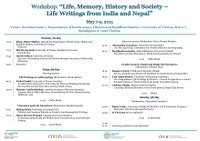Dear visitors,
please note that you are currently viewing the CIRDIS' old website. Its content is no longer being updated but it will remain online as a documentation of our previous work under this address: https://www.univie.ac.at/cirdis/2006-2015
Our new online presence can be found at the usual: https://www.univie.ac.at/cirdis
-
No events announced at the moment
Please consult the "past events"-section for a full list of our previously (co-)organized events, the "reports"-section for a series of reports on our activities or the "press"-section for media coverage concerning our work and members.
Rituale mit politischer Relevanz
The University of Vienna's Online magazine uni:view in conversation with Prof. Martin Gaenszle.
https://medienportal.univie.ac.at/uniview/forschung/detailansicht/artikel/rituale-mit-politischer-relevanz/
OUT NOW - Transfer of Buddhism Across Central Asian Networks (7th to 13th Centuries)
C. Meinert (ed.): Transfer of Buddhism Across Central Asian Networks (7th to 13th Centuries). With contributions by: Kazuo Kano, Deborah Klimburg-Salter, Rob Linrothe, Linda Lojda, Carmen Meinert, Henrik H. Sørensen, Monica Strinu, Gertraud Taenzer, Sam van Schaik, Jens Wilkens.
Book DOI: 10.1163/9789004307438
E - ISBN : 9789004307438
Workshop: "Life, Memory, History and Society - Life Writings from India and Nepal"
7th - 9th May 2015; seminar room 1 of the Department of South Asian, Tibetan and Buddhist Studies
Invitation: Workshop: "Life, Memory, History and Society" [PDF]
The Center for Interdisciplinary Research and Documentation of Inner and South Asian Cultural History (CIRDIS)
CIRDIS, directed by Univ.-Prof. Dr. Martin Gaenszle has been established in January 2006 at the University of Vienna by Univ.-Prof. Dr. Deborah Klimburg-Salter (director of CIRDIS from 2006 - 03/2015) as an inter-faculty unit for innovative research. Its aims are to encourage the development of new transdisciplinary models for research and to provide support for young scholars. Fundamental research concerning Inner and South Asia depends on intensive first-hand field research and exchange with scientists worldwide, which is both time and cost intensive. Thus, CIRDIS was linked with the interdisciplinary 6-year program for primary research, Nationales Forschungsnetzwerk (NFN) “The Cultural History of the Western Himalaya from the 8th Century” (CHWH), funded by the Austrian Science Fund (FWF).
Digital database
An essential tool for research and scientific exchange is the NFN/CIRDIS database complex, with 4 digital image databases at its core, all being built and maintained by subprojects (art history, inscriptions, epigraphy, numismatics), funded by the resources of the FWF-NFN. Three of these databases originated from the previous Research Focus (FSP) funded by the Austrian Science Fund from 2001 to 2006. The databases in art history, epigraphy, Western Tibetan manuscripts, and numismatics were the staging point for a new project within the field of geo-informatics. This project, administered within the Department of Geography, is a subproject of the FWF-NFN. The goal is to present the contents of the archives together, enriched with geospatial information, allowing new insights for researchers. This interface will also be made available to the public.
The documentation, digitisation, and formulation of new models for interactive learning and dissemination of information are additional goals of the NFN/CIRDIS. Therefore CIRDIS has started cooperation with the digitisation project for Byzantine art history within the Department of Art History. Internationally, a close association with a Tibetan photographic archive project at the Pitt-Rivers Museum, University of Oxford has been initiated.
Doctoral college
In March 2011 the doctoral college "Cultural Transfers and Cross-Contacts in the Himalayan Borderlands" was established in cooperation with the Faculty of Philological and Cultural Studies, the Faculty of Historical and Cultural Studies, the Faculty of Social Sciences and the Faculty of Earth Sciences, Geography and Astronomy. Detailed information concerning the doctoral college can be found here.






